读下面的句子,找出错误的一项并改正。() 1.Didyouplayedagameyesterday ?A B C( ) 2. Wehad funwatchthegame.AB C( ) 3.LiMingisplayingthesoccernow.A B C( ) 4.Da-六年级英语
Movie stars are usually popular with young people. 影星们常受到年青人的欢迎。
它的单数形式前常用不定冠词a / an , 当它的单数形式在句子中作主语时,句子的谓语也应用单数形式。
例如:There is an orange on the table .桌上有只桔子。
A university is a higher educational institution .大学是高等教育机构。
不可数名词是指不能以数目来计算,不可以分成个体的概念、状态、品质、感情或表示物质材料的东西;
它一般没有复数形式,只有单数形式,它的前面不能用不定冠词a / an ,若要表示它的个体意义时,必须与一个名词短语连用,相当于中文里的【一 +(量词)+ 名词】,其中的量词意义依与具体的名词搭配而定。
例如: a piece of bread【 cake(蛋糕), paper(纸), thread(线), cloth(布),furniture(家具), coal(煤), news(新闻), advice(意见), information(信息), work(工作), meat(肉) 】
一块面包【 一块蛋糕、一张纸、一根线、…… 】
an item of information 一则情报
a burst of applause 一阵掌声
a fit of anger 一顿脾气
a slip of paper 一张纸条
a length of cloth 一段布料
a cake of soap 一块肥皂
a tube of tooth-paste 一条牙膏
a bottle of ink 一瓶墨水
它在句子中作主语时,句子的谓语也只用单数形式。
例如: Water is a liquid .水是液体。
Wealth doesn't mean happiness .富有并不意味幸福。
物质名词和抽象名词大多为不可数名词,没有复数形式,前面一般也不能由不定冠词限定。
1、小学常见的物质名词有
表示液体的water, juice, milk, lemonade, coffee, coke, ink, tea, honey, jam等,
表示食物的food, rice, tofu, eggplant, bread, butter, cheese, chocolate, sugar等,
表示肉类的meat, mutton, beef, chicken, fish等,
表示其他无固定形状的物质的paper, dust, sand, gold, grass, chalk, glass, cloth, coal等。.
2、小学常见的抽象名词有:
news, weather, traffic, fun, work, money, luck, medicine, music, homework, housework,等.
考点名称:零冠词,不用冠词
- 零冠词:
是指名词前面没有不定冠词(a、an)、定冠词(the),也没有其他限定词的现象。
零冠词也是冠词的一种,一般表示为“/”而在文法中则根本不表示,“/”是英语词汇中最特殊的词,它没有拼写,没有读音,通常在口语表示时只是很短的停顿,但它的用法确实起着重要作用。 不用冠词的几种情况:
下列情况应免冠,代词限定名词前;
专有名词不可数,学科球类三餐饭;
复数名词表泛指,两节星期月份前;
颜色语种和国名,称呼习语及头衔。
①名词前已有作定语用的this,that,these,those,my,your,his,her,our,their,some等限定词。
例如:this eraser,her pencil-box,some boxes,these women等。
②泛指的不可数名词前一般不用冠词。
例如:meat,rice,water,bread,tea,milk,juice等。
③表示学科的名词前一般不用冠词。
例如:Chinese,maths,English,physics,history等。
④在三餐饭和球类运动前一般不用冠词。
例如:have breakfast/lunch/supper,play
basketball/football/volleyball/table tennis/tennis/pingpong等。
⑤复数名词表示泛指时不用冠词。
例如:His parents are both workers.他父母都是工人。
The people in the room are doctors.房间里那些人是医生。
⑥季节、节日、星期、月份前不用冠词。
例如:autumn,winter,Teachers' Day,Children's Day,Sunday,Wednesday,February,October等。
⑦表示颜色、语种和国家的名词前不用冠词。
例如:white,brown,French(法语),Japanese(日语),Australia,America(美国)等。
⑧表示称呼语的名词之前以及职务、头衔的名词后也跟有名词时不用冠词。例如:
What's wrong,Granny?老奶奶,怎么啦?
Doctor Green is a scientist.格林博士是位科学家。
考点名称:一般现在时,动词单数第三人称
一般现在时:
表示现在经常反复发生的动作、存在的状态或习惯性的动作的时态。可概括为
①经常性或习惯性动作;
②长期存在的特征或状态;
③普遍真理、客观事实等。
构成:
一般现在时用行为动词的原形,但第三人称单数作主语时,动词的词尾要加-S。
a. 表示经常性或习惯性的动作。
例:Li Ming always helps the old man. 李明一直帮助这位老人。
We usually go to school on foot. 我们通常步行上学。
They sometimes go fishing on Sundays. 他们有时周日去钓鱼。
b. 表示永恒不变的事实或真理。
例:A bird flies with wings. 鸟用翅膀飞翔。
c. 用在格言、谚语中。
例:Pride goes before a fall. 骄者必败。- 一般现在时具体用法:
1.表示经常的或习惯性的动作,常与表示频率的时间状语连用。
时间状语:
always,usually,every morning/night/evening/day/week/year,often,sometimes,
occasionally,from time to time,twice a week,rarely,seldom,once a month,hardly,ever,never.
e.g: I leave home for school at 7:00 every morning.
2.表示主语具备的性格、能力、特征和状态。
e.g:I don't want so much.
Ann Wang writes good English but does not speak well.
比较:Now I put the sugar in the cup.
I am doing my homework now.
3.表示客观事实和普遍真理。
e.g :The earth moves around the sun.
Shanghai lives in the east of China.
4.在时间状语从句和条件状语从句中,常用一般现在时代替将来时。
5.表示预先计划或安排好的行为。
6.小说故事用一般现在时代替一般过去时。新闻报道类的内容,为了体现其“新鲜”性,也用一般现在时来表示过去发生的事情。
7.有些表示状态和感觉的动词表示现在发生的具体行为时,只用一般现在时,而不用进行时态。
8.表示现在发生的具体动作或存在的状态
9表示格言或警句中。 e.g Pride goes before a fall. 骄者必败。
注意:此用法如果出现在宾语从句中,即使主句是过去时,从句谓语也要用一般现在时。
例:Columbus proved that the earth is round..
第一句用一般现在时,用于操作演示或指导说明的示范性动作,表示言行的瞬间动作。
再如:Now watch me,I switch on the current and stand back.
第二句中的now是进行时的标志,表示正在进行的动作的客观状况,所以后句用一般现在时。 - 一般现在时用法表:
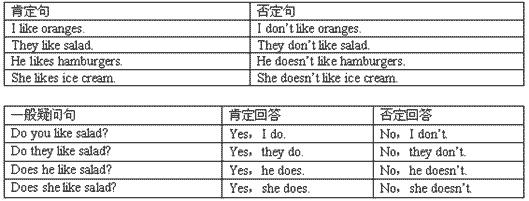
第三人称单数的构成见下表:
不规则变化have和be动词 变have为has 变be为am,is,are例: have-has; be-am,is,are词
构成
举例
一般情况
词尾+s
动词原形
第三人称单数
work(工作)
stop(停止)works
stops以-ch, -sh, s, x, o结尾
词尾+es
teach(教)
wash(洗)
dress(装扮)
fix(安装)
go(去)teaches
washes
dresses
fixes
goes以“辅音字母+y”结尾
变y为i,再加es
fly(飞翔)
try(尝试)flies
tries 一般现在时的特殊用法:
一些动词可用一般现在时来表达现在进行时:
verbs of the senses: hear,see,taste,smell,feel
verbs of the thinking: believe,know,mean,realize,think,remember
verbs of the linking: dislike,fear,heat,like,love,want
verbs of the possession: belong,have,own,possess
考点名称:动名词
- 最新内容
- 相关内容
- 网友推荐
- 图文推荐
| [家长教育] 孩子为什么会和父母感情疏离? (2019-07-14) |
| [教师分享] 给远方姐姐的一封信 (2018-11-07) |
| [教师分享] 伸缩门 (2018-11-07) |
| [教师分享] 回家乡 (2018-11-07) |
| [教师分享] 是风味也是人间 (2018-11-07) |
| [教师分享] 一句格言的启示 (2018-11-07) |
| [教师分享] 无规矩不成方圆 (2018-11-07) |
| [教师分享] 第十届全国教育名家论坛有感(二) (2018-11-07) |
| [教师分享] 贪玩的小狗 (2018-11-07) |
| [教师分享] 未命名文章 (2018-11-07) |

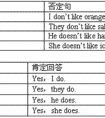
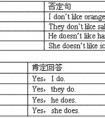
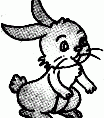
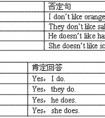
![____ it got four wheels?[ ]A. Have B. There C. Has-五年级英语](http://www.00-edu.com/d/file/ks/4/1/65/2019-08-31/small2ca0aeba76320ba6f81e40fe83a0e8111567199443.png)
